 Wittgenstein on Mathematics This book offers a detailed account and discussion of Ludwig Wittgensteins philosophy of mathematics. the stage is set with a brief presentation of Freges logicist attempt to provide arithmetic with a foundation and Wittgensteins criticisms of it, followed by sketches of Wittgensteins early views of mathematics, in the Tractatus and in the early ittgensteins mature philosophy of mathematics (193744) is carefully presented and examined. Schroeder explains that it is based on two key ideas: the calculus view and the grammar view. On the one hand, mathematics is seen as a human activitycalculation rather than a theory. On the other hand, the results of mathematical calculations serve as grammatical norms. The following chapters (on mathematics as grammar; rule-following; conventionalism; the empirical basis of mathematics; the role of proof) explore the tension between those two key ideas and suggest a way in which it can be resolved.
Wittgenstein on Mathematics This book offers a detailed account and discussion of Ludwig Wittgensteins philosophy of mathematics. the stage is set with a brief presentation of Freges logicist attempt to provide arithmetic with a foundation and Wittgensteins criticisms of it, followed by sketches of Wittgensteins early views of mathematics, in the Tractatus and in the early ittgensteins mature philosophy of mathematics (193744) is carefully presented and examined. Schroeder explains that it is based on two key ideas: the calculus view and the grammar view. On the one hand, mathematics is seen as a human activitycalculation rather than a theory. On the other hand, the results of mathematical calculations serve as grammatical norms. The following chapters (on mathematics as grammar; rule-following; conventionalism; the empirical basis of mathematics; the role of proof) explore the tension between those two key ideas and suggest a way in which it can be resolved.
Finally, there are chapters analysing and defending Wittgensteins provocative views on Hilberts formalism and the quest for consistency proofs and on Gdels incompleteness theorems. Severin Schroeder is Associate Professor of Philosophy at the University of Reading. He has published three monographs on Wittgenstein: Wittgenstein: The Way Out of the Fly Bottle (2006), Wittgenstein Lesen (2009), and Das Privatsprachen-Argument (1998). He is the editor of Wittgenstein and Contemporary Philosophy of Mind (2001) and Philosophy of Literature (2010). Wittgensteins Thought and Legacy Edited by Eugen Fischer University of East Anglia, UK Severin Schroeder University of Reading, UKWittgenstein on Thought and WillRoger TeichmannWittgenstein on Sensation and PerceptionMichael HymersWittgenstein and NaturalismEdited by Kevin M. Cahill and Thomas RaleighWittgenstein on MathematicsSeverin Schroeder For more information about this series, please visit: www.routledge.com/ Wittgensteins-Thought-and-Legacy/book-series/WTL Wittgenstein on MathematicsSeverin Schroeder First published 2021 by Routledge 52 Vanderbilt Avenue, New York, NY 10017 and by Routledge 2 Park Square, Milton Park, Abingdon, Oxon, OX14 4RN Routledge is an imprint of the Taylor & Francis Group, an informa business 2021 Severin Schroeder The right of Severin Schroeder to be identified as author of this work has been asserted by him in accordance with sections 77 and 78 of the Copyright, Designs and Patents Act 1988.
All rights reserved. No part of this book may be reprinted or reproduced or utilised in any form or by any electronic, mechanical, or other means, now known or hereafter invented, including photocopying and recording, or in any information storage or retrieval system, without permission in writing from the publishers. Trademark notice: Product or corporate names may be trademarks or registered trademarks, and are used only for identification and explanation without intent to infringe. Library of Congress Cataloging-in-Publication Data Names: Schroeder, Severin, author. Title: Wittgenstein on mathematics / Severin Schroeder. | Series: Wittgensteins thought and legacy | Includes bibliographical references and index. | Series: Wittgensteins thought and legacy | Includes bibliographical references and index.
Identifiers: LCCN 2020037371 (print) | LCCN 2020037372 (ebook) | ISBN 9781844658626 (hardback) | ISBN 9781003056904 (ebook) Subjects: LCSH: MathematicsPhilosophy. Classification: LCC QA8.4 .S376 2021 (print) | LCC QA8.4 (ebook) | DDC 510.1dc23 LC record available at https://lccn.loc.gov/2020037371 LC ebook record available at https://lccn.loc.gov/2020037372 ISBN: 978-1-844-65862-6 (hbk) ISBN: 978-1-003-05690-4 (ebk) Typeset in Sabon by Apex CoVantage, LLC Contents vi ContentsContents vii This book aims to offer a coherent account of Wittgensteins mature phi losophy of mathematics. As his later philosophy of language and mind presented in Philosophical Investigations is vastly superior to the ideas developed in his first book Tractatus Logico-Philosophicus indeed his later work can be seen as the result of a profound understand ing of the shortcomings of his early worksimilar cognitive progress might be expected, and can I think be found, in Wittgensteins thinking about mathematics. It would certainly appear that Wittgenstein himself regarded the extensive changes and developments of his views on math ematics as important progress when in 1944 he was asked to revise an entry about himself for a biographical dictionary and added the sentence: Wittgensteins chief contribution has been in the philosophy of math ematics (Monk 1990, 466). Accordingly, I shall focus on his most con sidered views, on his mature philosophy of the 1930s and 1940s, with only a brief sketch of his earlier views. However, in spite of the relative importance that Wittgenstein accorded to his work on mathematics, he did not succeed in producing anything like a book or comprehensive and revised expression of his thoughts in that area.
In the Preface (dated 1945) to Philosophical Investigations the reader is promised remarks on various topics, including the foundations of mathematics, but Wittgenstein changed his mind and decided to deal with the philosophy of mathematics separately, in another volume. The plan to write such a book was still there in 1949 (MS 169, 37), but was never carried out. All we have are one typescript and numerous unrevised manuscripts (or parts of manuscripts) with Wittgensteins philosophical thoughts on mathematics, a collection of which was posthumously pub lished as Remarks on the Foundations of Mathematics. It has even been doubted whether Wittgensteins later philosophy of mathematics can be said to present something that amounts to a coherent view (Potter 2011, 135). I shall try to show that that is an exaggeration. Although his thoughts never reached the stage of a fully worked-out and polished posi tion, his general view is clear enough.
At one point when his attention had shifted to issues in the philosophy of mind, Rush Rhees asked him Preface ix what was to become of his work on mathematics and he replied lightly: Oh, someone else can do that (Monk 1990, 466). Perhaps he himself thought that he had produced at least the rough outlines of a reasonable philosophical account of mathematics, which he could leave to others to flesh out in detail. And yet there are undoubtedly considerable gaps, open questions, inconsistencies between different tentatively considered answers, and even tensions between some of the key ideas, in Wittgensteins philoso phy of mathematics. Therefore, drawing from his remarks a consistent position in the philosophy of mathematics is not just an exegetical chal lenge, but involves philosophical considerations. The reader has to decide which of a number of tentative or provisional remarks to put interpre tative weight on and which ones to dismiss as carelessly phrased or as dead ends. Moreover, where the most promising and persuasive remarks remain very sketchy, it takes some extrapolation to present them as (part of) a plausible position.
Therefore, what I present, though always follow ing the general thrust of Wittgensteins ideas, will occasionally go beyond them in its details. And since a plausible philosophical position is what Im interested in, I shall not just present, but also discuss and evaluate Wittgensteins ideas. By and large, I found myself able to defend Witt gensteins views, mainly with arguments drawn from his own remarks, sometimes by recourse to additional considerations of my own. Some times I have remained unconvinced by his considerations and shall raise concerns or objections. It appears that Wittgensteins interest in philosophy was first prop erly awakened when mathematical problems that he encountered while studying engineering led him to reflect on the philosophy of mathemat ics. He was attracted by the foundationalist programme of logicism and in 1911 first visited Frege in Jena and then became a student of Russells in Cambridge (von Wright 1954, 56).
Next page
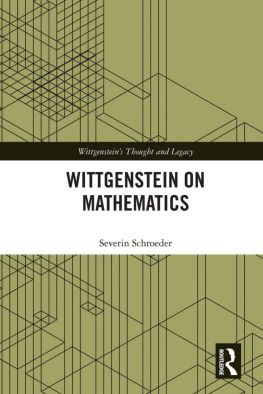
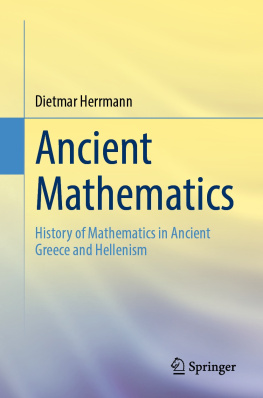

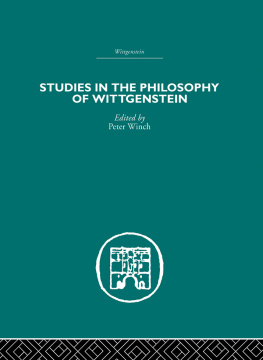

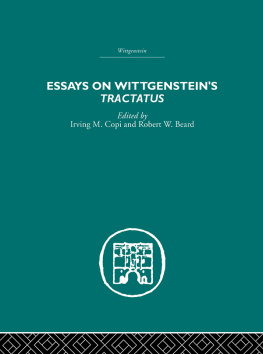
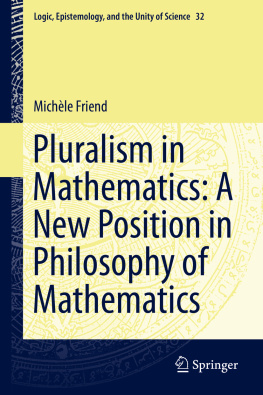
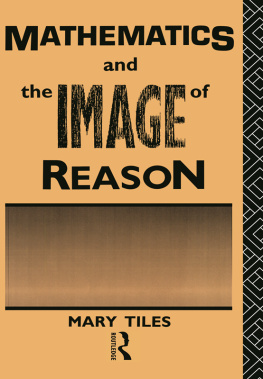
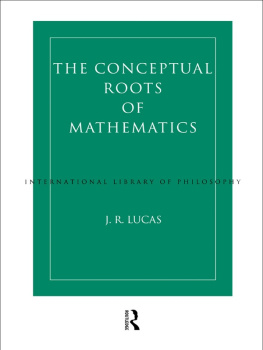

 Wittgenstein on Mathematics This book offers a detailed account and discussion of Ludwig Wittgensteins philosophy of mathematics. the stage is set with a brief presentation of Freges logicist attempt to provide arithmetic with a foundation and Wittgensteins criticisms of it, followed by sketches of Wittgensteins early views of mathematics, in the Tractatus and in the early ittgensteins mature philosophy of mathematics (193744) is carefully presented and examined. Schroeder explains that it is based on two key ideas: the calculus view and the grammar view. On the one hand, mathematics is seen as a human activitycalculation rather than a theory. On the other hand, the results of mathematical calculations serve as grammatical norms. The following chapters (on mathematics as grammar; rule-following; conventionalism; the empirical basis of mathematics; the role of proof) explore the tension between those two key ideas and suggest a way in which it can be resolved.
Wittgenstein on Mathematics This book offers a detailed account and discussion of Ludwig Wittgensteins philosophy of mathematics. the stage is set with a brief presentation of Freges logicist attempt to provide arithmetic with a foundation and Wittgensteins criticisms of it, followed by sketches of Wittgensteins early views of mathematics, in the Tractatus and in the early ittgensteins mature philosophy of mathematics (193744) is carefully presented and examined. Schroeder explains that it is based on two key ideas: the calculus view and the grammar view. On the one hand, mathematics is seen as a human activitycalculation rather than a theory. On the other hand, the results of mathematical calculations serve as grammatical norms. The following chapters (on mathematics as grammar; rule-following; conventionalism; the empirical basis of mathematics; the role of proof) explore the tension between those two key ideas and suggest a way in which it can be resolved.